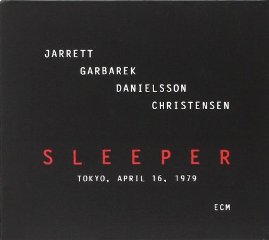Keith Jarrett-Jan Garbarek-Palle Danielsson-Jon Christensen – Sleeper (1979)
Keith Jarrett-Jan Garbarek-Palle Danielsson-Jon Christensen – Sleeper (1979)

Disc 1 1. Personal Mountains (Live) 21:12 2. Innocence (Live) 10:47 3. So Tender (Live) 13:27 Disc 2 1. Oasis (Live) 28:13 2. Chant Of The Soil (Live) 14:53 3. Prism (Live) 11:15 4. New Dance (Live) 7:07 Keith Jarrett - piano, percussion Jan Garbarek - tenor saxophone, soprano saxophone, flute, percussion Palle Danielsson - double bass Jon Christensen - drums, percussion
Keith Jarrett has amassed such an imposing body of work, it will be fascinating to see how his legacy shakes out. It’s safe to say a large bloc of his jazz followers will rate his live solo piano recordings, with their remarkable extended improvisations, as his most important contribution. Jarrett’s Standards Trio with Gary Peacock and Jack DeJohnette has proven to be his most popular and durable unit over 25 years. And with a lineup including Dewey Redman, Charlie Haden and Paul Motian, his so-called “American Quartet” of the ’70s is considered by many to be his greatest working band.
But what about their counterpart, the “European Quartet,” with saxophonist/flutist Jan Garbarek, drummer Jon Christensen of Norway and bassist Palle Danielsson of Sweden? Less prolific than the Americans, and less edgy and combustible, that unit was still a force to be reckoned with. Sleeper, a newly discovered recording that documents a 1979 Tokyo concert, reminds us of this foursome’s special qualities: its cohesive warmth, its effortlessly expansive reach and its ease in translating Jarrett’s highly personal language in an international setting.
The first thing that may strike you about Sleeper—especially if you’ve been listening to recent Jarrett albums including Jasmine, his exquisitely pared-down duets with Haden, and Rio, an extended suite of mostly five- and six-minute sections—is its boundless energy. Jarrett was still in his 20s at the time of the concert. The 21-minute opening track, “Personal Mountains,” keeps building and building on a simple fetching melody, infused with Latin accents (Jarrett switches at one point to timbales) and such forcefully delineated left- and right-hand statements from the pianist that the music sometimes seems to be emanating from a quintet. Not until the 15-minute mark do things calm down, with a lyrical interlude that paves the way for a seamless segue into the lovely, hymn-like “Innocence.”
Jarrett cuts one of his shimmering pop-gospel grooves on “Chant of the Soil,” and dips infectiously into calypso on “New Dance.” The centerpiece of the concert is the 28-minute opus “Oasis,” which opens with flute and African percussion and, charged by Danielsson’s electrifying bowing and Jarrett’s hammered single notes, works its way through kaleidoscopic changes that include subtle nods to Ornette Coleman.
Garbarek was more of a role player in this band than the irrepressible Redman was with the Americans, but he played his role exceptionally well. Working over the melodies on tenor with rapt intensity, keeping his improvisations close to the surface—perhaps a bit too close—he steps away from his post-Coltrane identity to emulate Sonny Rollins. Jarrett has never enjoyed a more relaxed rapport than he does with Garbarek and their rhythm mates. Danielsson lends glowing support even when he’s in deep background; Christensen has a way of lulling you with rolling figures and then hitting you with explosive accents.
Sleeper, recorded in April 1979, is the third and best-sounding documentation of this quartet’s final tour, joining the single-disc Personal Mountains, recorded the same month in Japan (and released in 1989) and the two-CD Nude Ants, recorded in May ’79 at the Village Vanguard. Though six of the seven songs on Sleeper appear on the other live albums, there is little sense of duplication. This is a markedly different performance from the others, whether measured by instrumental changes such as Garbarek’s opening on flute instead of soprano saxophone on “Oasis,” or the way the pieces unfold and how long it takes them to do so. The spontaneity is reflected in Jarrett’s vocal expressions of delight. At other times, his utterances are a distraction. Here, they are fully earned. ---Lloyd Sachs, jazztimes.com
download (mp3 @320 kbs):
yandex 4shared mega mediafire zalivalka cloudmailru oboom uplea








